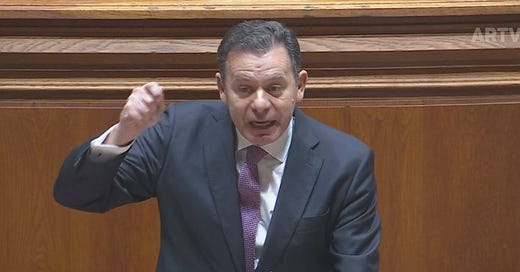PM reacts sharply to migrant healthcare query in Parliament
The SNS spent nearly €34M euros last year providing care to foreign citizens. The largest share, €28M, pertains to European citizens and was fully reimbursed by their countries of origin.
What?
A question about healthcare access for non-resident, undocumented immigrants sparked a heated exchange in Portugal’s Parliament on Wednesday.
The Secretary-General of the Socialist Party (PS), Pedro Nuno Santos, asked PM Luís Montenegro how hospitals should respond if a pregnant undocumented woman, a foreigner with an infectious disease, or a mother with a sick child sought care.
“The answer is simple and obvious: hospitals must treat these people,” Montenegro replied.
He then emphasized that providing care is fundamentally different from “promoting or enabling fraudulent networks and criminal schemes that undermine the National Health Service (SNS),” which he called “intolerable.”
Montenegro questioned whether Santos was suggesting an open-door policy for undocumented migrants, stating, “Are you telling the world they can come here because the door is always open?”
In response, Santos criticized Montenegro’s stance, remarking, “The PM’s irritation on this topic is clear. In a country with Portugal’s sense of humanity, there are unacceptable situations, but the scenarios I mentioned would not be possible under the PSD’s proposed legislation. If they are, what is the point of this proposal?”
Santos argued that the PSD’s proposal on foreign nationals’ access to the SNS is a source of shame for the party and accused it of being supported by the far-right Chega party.
“This issue embarrasses the PSD and all of us, but it was the PSD, with Chega’s backing, that introduced this legislation. That says a lot,” Santos stated during the final moments of the biweekly parliamentary debate.
Only €5 million in unpaid foreign patient bills
Meanwhile, new data seen by Observador, revelead that Portugal’s National Health Service (SNS) spent nearly €34 million last year on healthcare for foreign patients.
The largest share, €28 million, pertains to European citizens and was fully reimbursed by their countries of origin, while the remaining roughly €5 million was spent on patients from Portuguese-speaking countries, for which no reimbursement agreements exist.
According to data from the Central Administration of the Health System (ACSS), €4.88 million of the unreimbursed amount was spent on citizens from five Portuguese-speaking African countries (PALOP).
The largest share, €2.31 million, went to patients from Cabo Verde, followed by Guinea-Bissau (€1.36 million), São Tomé and Príncipe (€827,000), Angola (€263,000), and Mozambique (€107,000).
These figures have remained relatively stable over the past three years, with minor fluctuations.
Agreements with these nations, established as early as 1977, ensure medical assistance for patients whose home countries lack adequate healthcare infrastructure.
Portugal covers hospitalization, outpatient care, diagnostic exams, and even ambulance transportation from the airport to hospitals.
Among European countries (including the EU and countries such as the United Kingdom and Iceland), the highest expenditure was incurred with citizens from France, which accounted for nearly €15 million of the €28 million reimbursed in 2023.
The Ministry of Health refused to release exact figures on the number of foreign patients and the specific medical specialties that they have used in the past years.
Healthcare Professionals Oppose Proposed Access Limitations
Meanwhile, over 1,600 healthcare professionals have signed an open letter opposing the measure, arguing it violates constitutional and international laws while exacerbating health inequities.
The letter highlights potential public health risks, such as the discontinuation of vaccination programs and inadequate monitoring of infectious diseases.
It also disputes claims about financial strain, citing an inspection report showing that foreign non-residents accounted for less than 1% of emergency visits in 2023, a negligible impact compared to the millions of tourists visiting Portugal annually.
Healthcare professionals emphasize that excluding migrants, including workers awaiting residency due to procedural delays, undermines fundamental rights and worsens health outcomes.
They urge policymakers to consider solutions that uphold the SNS’s commitment to universal healthcare.
The letter has been sent to key political figures, including the President and the Prime Minister, with requests for formal discussions in the Parliamentary Health Committee.
The signatories reaffirm their dedication to providing care to all, regardless of immigration status, and stress that systemic reforms, not exclusionary policies, are needed to address SNS challenges.




